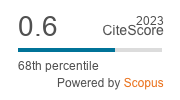Soviet Diplomacy on the Creation of the Independent State of Croatia
DOI:
https://doi.org/10.22586/csp.v51i2.8419Keywords:
Soviet Union; Independent State of Croatia; diplomacy; Germany; Italy; 1941; April War (Axis invasion of Yugoslavia)Abstract
During the interwar period, in the climate of a lack of regular diplomatic relations between the Yugoslav kingdom and Soviet Russia/the USSR, the Soviet side came to see the Yugoslav state as an artificial creation that needed to be destroyed. Later, the stance that the Yugoslav state needed to be reconstituted on a federal basis became more accepted. Despite a series of attempts to normalise interstate relations, a series of controversies, one of the most important being the Soviet stance towards the national question in Yugoslavia, resulted in a lack of regular diplomatic communication between the two states. After long negotiations, official diplomatic relations were established in summer 1940. The most influential Croatian political party – the Croatian Peasant Party led by Vladko Maček – supported the Yugoslav rapprochement with the USSR, seeing in it a sort of counterbalance to aggressive Italian policy towards the Balkans. The Soviet side saw Croatian-Serbian relations – the backbone of the Yugoslav state – as deeply conflicting interests of two opposed bourgeoisies that maintain their political monopoly through compromises and agreements and thus oppose the revolutionary strivings of the working people. They believed that Italy, and especially Germany, would try to use the deep-rooted contradictions between the Serbian and Croatian national bodies in the Yugoslav state in order to destabilise it from within. Soviet diplomacy was convinced that Germany would try to convert Croatia into a starting point for spreading its influence in the Yugoslav lands. They anticipated that, instead of the Croatian Peasant Party, the Axis forces would place their trust in the Ustasha movement and entrust its leader, Ante Pavelić, to lead an independent Croatian state, which would in fact be a puppet state similar to Slovakia. They believed that the Ustasha movement, through its statements and proclamations during the April War, managed to play an important role in the collapse of the Yugoslav kingdom. The Soviets considered the newly-established Croatian state under German and Italian patronage a quisling political creation completely dependent on the Axis powers. The Independent State of Croatia’s political and economic treaties with Italy were interpreted as proof of its status as an Italian protectorate. Despite the fears of the Yugoslav government in exile that the USSR could recognise the Independent State of Croatia and establish diplomatic relations with it, this did not come to pass due to the Soviets’ negation of its state subjectivity.
Downloads
Published
How to Cite
Issue
Section
License
Copyright (c) 2019 authors and journal

This work is licensed under a Creative Commons Attribution-NonCommercial 4.0 International License.
Copyright holders are the publisher Croatian Institute of History and the authors. Journal of Contemporary History is an Open Access journal. Users are allowed to read, download, copy, redistribute, print, search and link to material, and alter, transform, or build upon the material, or use them for any other lawful purpose as long as they attribute the source in an appropriate manner according to the Creative Commons licence CC BY-NC. The papers published in Journal of Contemporary History can be deposited and self-archived in the institutional and thematic repositories providing the link to the journal's web pages and HRČAK. Journal does not charge article processing charges (APC). The editors assume no responsibility for statements of fact or opinion made by contributors.




